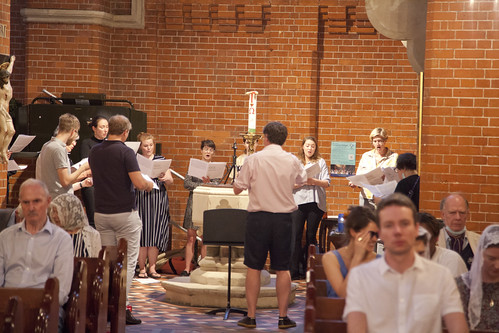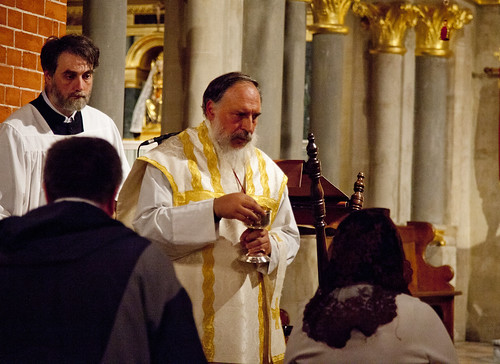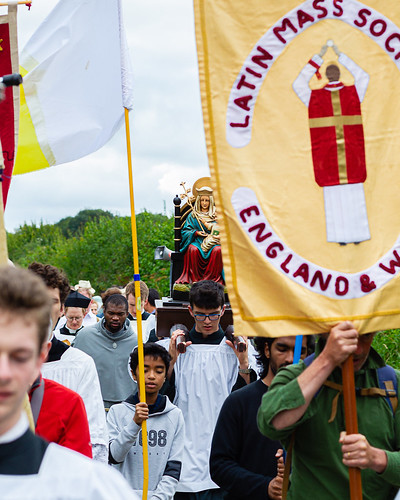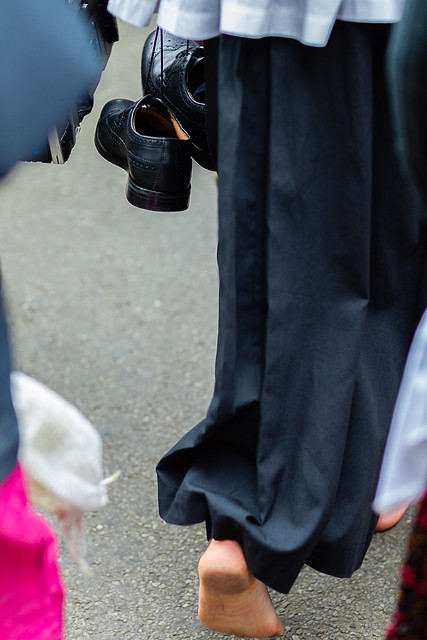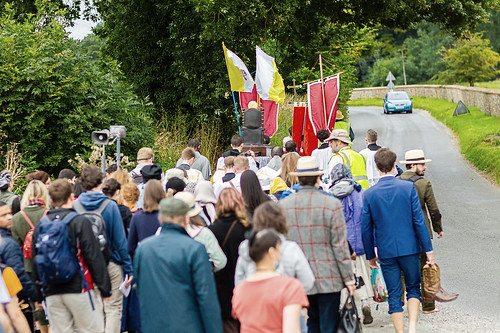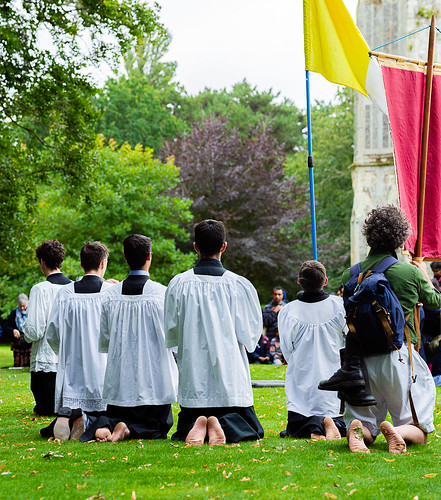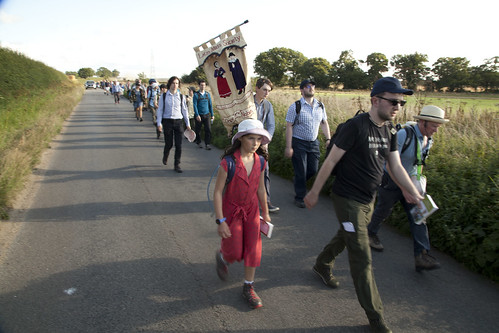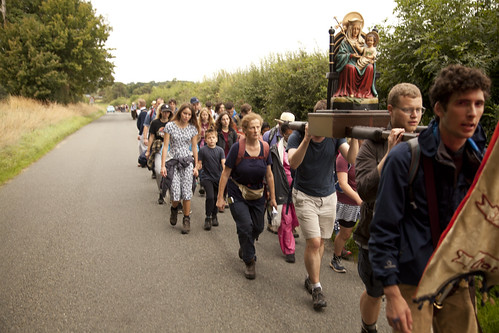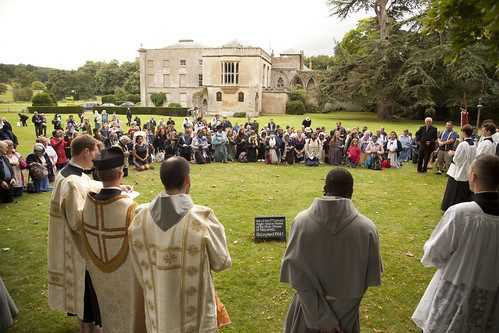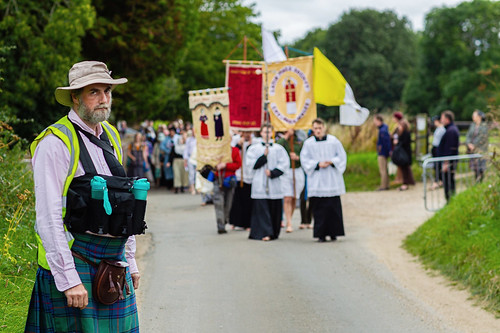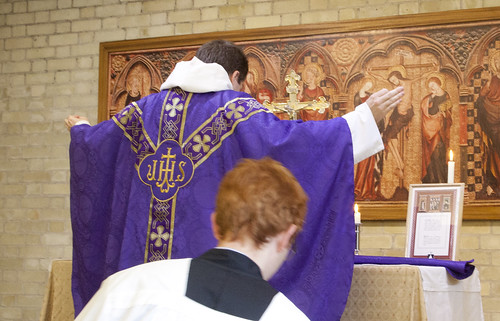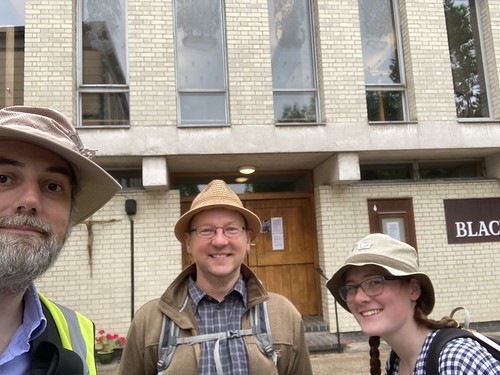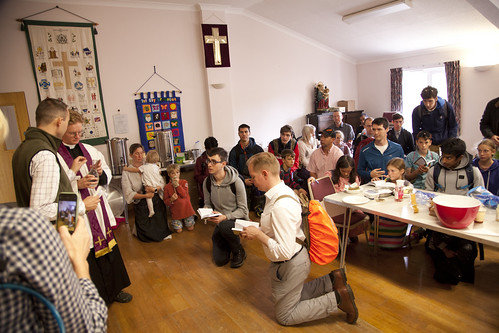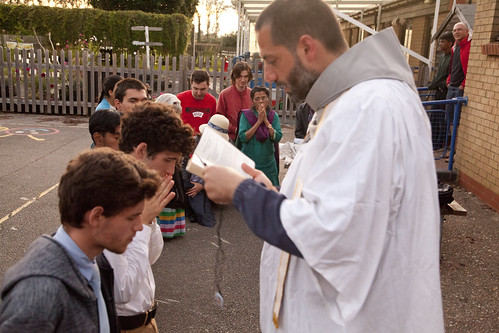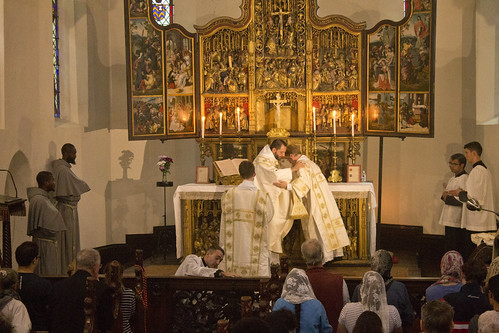Chairman's Blog
Monday Masses at Maiden Lane: professionally-led singing returns
We are now back, and last night we had the first Mass with the newly formed Southwell Consort. This is led by Dominic Bevan and consists mainly of men and women with musical training who have chosen not to pursue music as a career. It is an opportunity for them to sing some lovely sacred music in the liturgical setting for which it was composed. Last evening they had a whopping 17 singers. They sang Missa O Quam Gloriosum, Victoria; Ave Maria a 8, Victoria; Panis Angelicus, Rebelo, and I must say (hearing this from the sanctuary where I was serving) it was extremely impressive.
Next week, the Houghton Schola will return: also to be led regularly by Dominic Bevan, this is an all-male group singing Gregorian Chant, for singers of all levels of experience.
The next Monday evening Mass will be a High Mass, a Votive of the Blessed Sacrament, part of the series of Masses in London linked to the Eucharistic Congress taking place in Hungary. In honour of the occasion the Houghton Schola will be joined by some polyphonists.
LMS Walsingham Pilgrimage: more photos
LMS Walking Pilgrimage to Walsingham, Part 2
The little girl in red managed the entire walk, 56 miles over three days.
Our fantastic non-walking volunteers, on Saturday evening in Great Massingham.
Some of the tents at Great Massingham.
Dinner at Great Massingham Village Hall.
That evening we enrolled four members of the LMS' servers' guild, the Society of St Tarcisius.
Walking on Sunday morning, accompanied by the processional statue.
The final Mass of the Pilgrimage, in the Catholic Shrine in Houghton St Giles. The medieval shrine at Walsingham was of course destroyed by Henry VIII; the restored Catholic shrine today is based around a medieval 'slipper chapel', a wayside pilgrims' chapel, the last on the route and the marker of the Holy Mile to the shrine proper. The larger church there, the 'Reconciliation Chapel' pictured above, is always a challenge to photograph, but this year we filled it, with a congregation of about 350. This included many people who joined us by car and coach, and also people who just happened to be at the shrine, including many Syro-Malabar Catholics and Travelers.
So after Mass we form up again, with many more people than before, and walk the Holy Mile singing the Rosary and the Te Deum.
We arrive at what is left of Walsingham Priory, which once housed the Holy House. This represented the house of the Annunciation in Nazareth, and was established at the command of Our Lady herself on the eve of the Norman Conquest.
There we venerated the processional statue we had brought with us and received the special blessing of returning pilgrims from the Roman Ritual.
The following morning, those of us who have stayed the night locally squeeze into the Slipper Chapel for a Sung Mass.
LMS Walking Pilgrimage to Walsingham: Photos, Part 1
Contradictions among those defending Traditionis Custodes
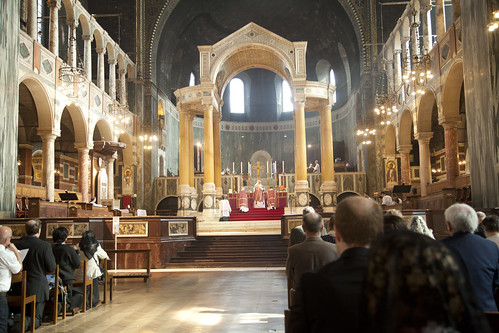 |
| Final blessing at the High Mass in Westminster Cathedral; Mass for the Latin Mass Society's AGM |
My latest on 1Peter5: on some conflict among those who defend Traditionis Custodes.
Pope Francis has offered two reasons for wishing to bring celebrations of the Traditional Mass to an end: attitudes of some of the faithful which have become associated with this form of the Mass, and the idea that the unity of the Church requires a unity of liturgical rite. Accordingly, some of his defenders have focused on one of these points, and some on the other. Both are having difficulty explaining and justifying Pope Francis’ action.
I recently fisked an article by Michael Sean Winters which laid the blame for Traditionis Custodes (TC) on the people who like it, singling out the journalist Michael Brendan Dougherty. There is much wrong with Winters’ argument, but suppose he was right about Dougherty being a dangerous schismatic, what would be the significance of this? To be crass about it, who cares what some journalist thinks? If he were the head of an organization, clerical or lay, with serious popular support, which was closely associated with the TLM, that might indicate a wider problem, but as it is, it proves nothing at all.
As if realizing that he needed to widen his evidence base, towards the end of his article Winters brings in Martin Mosebach, accusing him of rejecting Vatican II without being able to quote him doing so, and the views of George Weigel, apparently unaware that Weigel has a long and distinguished history of gratuitouslyinsulting Catholics attached to the Traditional Mass. As a representative of the movement, he doesn’t really fit the bill. Nevertheless, that’s the best Winters can come up with.
Another problem with this approach is identified by Terrence Sweeney on the Where Peter Is blog, and in fact is acknowledged even by Winters himself: in Sweeny’s words, “Even if many are acting schismatically, this does not justify a restriction that affects those who attend the Tridentine rite but remain faithful.”
Read it all there.
Is Traditionis Custodes calling for more Latin?
 |
| High Mass in Westminster Cathedral for the Latin Mass Society. Photo by John Aron |
Cross-posted from Rorate Caeli.
A number of American writers claim that Traditionis Custodes should spur priests to make their celebration of Mass more reflective of the liturgical tradition. Others commentators, including a number of bishops implementing it, apparently think the opposite.
Those in favor of the first interpretation can cite a couple of passages from the Letter to Bishops which accompanied Traditionis Custodes. Pope Francis quotes Pope Benedict complaining about liturgical abuses—“unbearable distortions”; later he remarks:
Whoever wishes to celebrate with devotion according to earlier forms of the liturgy can find in the reformed Roman Missal according to Vatican Council II all the elements of the Roman Rite, in particular the Roman Canon which constitutes one of its more distinctive elements.
The Roman Canon being Eucharistic Prayer I in the reformed Missal.
The two most influential American blogs defending Traditionis Custodes, Pray Tell and Where Peter Is, have accordingly taken this line. Fr Anthony Ruff of the Pray Tell blog writes:
The goal is that the entire Roman rite celebrates the liturgy of Vatican II in all the spiritual profundity and sacrality which remains to be discovered in the 1970 Missal, so that there is less reason for people to seek out the 1962 alternative.
Terrence Sweeney on Where Peter Is calls for more celebrations of the Novus Ordo in Latin and with “proper liturgical garments, fully celebrated liturgies, processions, and yes smells and bells,” a celebration that is “richly traditional”.
By contrast, the bishops who have been most prominent in implementing Traditionis Custodes are not encouraging their priests to make their celebrations of Mass any closer in spirit to Traditional Mass: quite the contrary. The Bishops Conference of Costa Rica, for example, in what seems like an inversion of Pope Francis’ words about continuity quoted above, warn against “any element coming from the ancient form”. One bishops has actually suspendeda priest for celebrating the Novus Ordo in Latin.
One American diocese, Rockford, Illinois, whose Vicar General Monsignor Eric Barr has written defending Traditionis Custodes, in 2017 bannedpriests from celebrating the Novus Ordo facing east, facing same direction as the congregation, in the traditional manner, despite this being permitted by the rules of the Novus Ordo.
The French bishops, whose reporton the spread of the Traditional Mass in their dioceses became public early this year, felt that “when elements are introduced into the OF they are more sources of tension than of enrichment.” What sort of “elements” did they have in mind?
Use of old vestments, and the use of black as a liturgical color. The adding of Signs of the cross. Veiling of statues in Passiontide. Blessing of the water at the Offertory. The sacring bell, communion plates.
In the Novus Ordo the bell is explicitly allowed as a “local custom” and black “where it is the practice” (General Instruction of the Roman Missal 150 and 346 respectively); the use of the Communion plate (paten) is actually required (Redemptionis Sacramentum 93).
The use of the more traditional options which exist in the Novus Ordo is sometimes called “the reform of the reform”. Fr Ruff and others like him think that this is more important than ever, because it show the continuity between the reformed Mass and the earlier liturgical tradition; liturgically progressive bishops, on the other hand, think that the reform was right to relegate these practices to the status of mere options, and thinks the actual use of these options is a retrograde step.
Pope Francis has, in fact, made his own position quite clear. He famously brokethe liturgical rules by washing the feet of a Muslim female on Maundy Thursday in 2013. Whatever one thinks of his action, it did not give an example of strict adherence to norms.
In 2015 he was reported as follows, after a long meeting with the priests of Rome:
The Pope noted that there are priests and bishops who speak of a “reform of the reform.” Some of them are “saints” and speak “in good faith.” But this “is mistaken”, the Holy Father said.
In 2016 he reacted negativelyto Cardinal Robert Sarah’s encouragement of the celebration of Mass facing east. Earlier this year priests were bannedfrom celebrating individual Masses in St Peter’s in Rome, and forced to concelebrate in Italian instead.
Taking all this into account, there is no justification for reading Traditionis Custodes as a call for making celebrations of the Novus Ordo more traditional. On the other hand, the Traditional Latin Mass is still allowed wherever a local bishop gives permission. Indeed, the only way for a priest to celebrate an individual Mass, or a Mass in Latin, at St Peters’ side altars, is now in a limited number of slots allocated to the Traditional Mass. Pope Francis and his allies among the bishops seem to prefer a situation in which the Traditional Mass is the only alternative to progressive-style Novus Ordo celebrations. This polarization of liturgical options has precisely the effect feared by Fr Ruff: it gives people greater reason to seek out the Traditional Mass. Pope Francis’ liturgical policies may in the end do more to promote attendance at the Traditional Mass than to discourage it.
Latin: not as dead as you think, on Catholic Answers
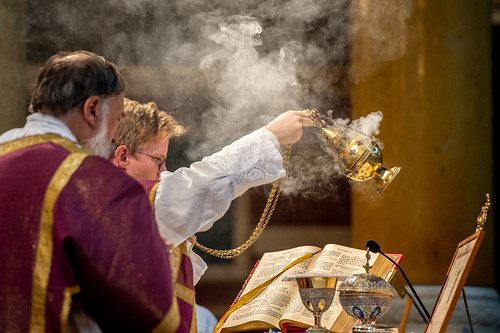 |
| Fr Henry Whisenant insensese the Altar in Westminster Cathedral: Annual Mass for the Latin Mass Society |
From an early date, the Church in the West has used Latin—not only for administration, study, and communication, but for prayer. This was natural for regions where Latin was the majority language, but as the centuries passed, the Western Church persisted with a Latin liturgy in evangelizing peoples on and beyond the edges of the Roman Empire not conversant with it, such as the North African speakers of Punic and the speakers of Celtic and Germanic languages in western and central Europe. By contrast, the Eastern Churches sometimes made use of the languages of their new converts, even when these had to be specially developed in their written forms for this to be possible, as with Ethiopia’s Ge’ez and Russia’s Church Slavonic.
There is thus a close association between the Western Church and the Latin language. Even today, when the liturgy can be celebrated in a huge range of languages, this relationship has left its mark, and Latin remains an option for both public and private prayer—not only in celebrations of the pre-Vatican II liturgy, but also for the reformed Mass.
Why has the Church been so attached to Latin? The answer is that liturgical Latin is not just a convenient language, but a sacred language.
The LMS' London chant schola, the Houghton Schola, will return to singing in September
 |
| Corpus Christi, Maiden Lane, London |
Cross-posted from the Gregorian Chant Network blog.
It has been a long winter for Gregorian Chant, but we can finally announce that the Houghton Schola, the Latin Mass Society's all-male training schola for London, will resume rehearsing and singing in September.
They will be singing at Corpus Christi Maiden Lane, two Monday evening Masses a week, and as a rule they will have one rehearsal a month to prepare both Masses, in the office of the LMS itself, which is in Macklin Street, Holborn.
To register your interest in singing, please email southwell@lms.org.uk
The Director, Dominic Bevan, is also leading a new, mixed, polyphonic consort, the Southwell Consort, which you can also enquire about through this address.
The Houghton Schola trains chant singers who may or may not have previous experience. The Southwell Consort provides an opportunity to sing in a liturgical setting for people with musical training but who have not become professional musicians.
The first rehearsal of the Houghton Schola will be on Friday 10th September.
Iota Unum Podcast on the former Communist bloc
Michael Sean Winters attacks Michael Brendan Dougherty
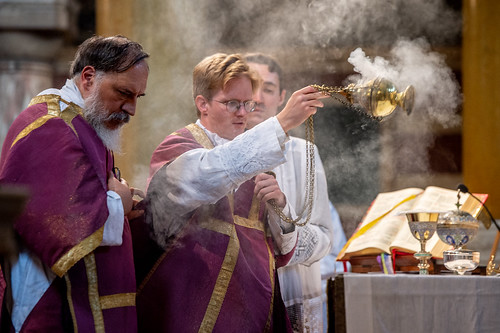 |
| Fr Henry Whisenant at Westminster Cathedral on Saturday; photo by John Aron |
Michael Sean Winters has written an attack, mainly on an article by Michael Brendan Dougherty (MBD), and it is interest to contrast MBD's sometimes artless sincerity and distress over Traditionis Custodes with Winters' manipulation of the facts and instrumentalisation of Pope Francis. For Winters Traditionis Custodes is not about the liturgy at all: it is an instrument of political power. This is what theology and spirituality has come down to for Winters and his little gang.
Winters' words in black, my comments in red.
--------------------
In the weeks following Pope Francis' Traditionis Custodes, the motu proprio rendering his decision to revoke the permissions to celebrate the traditional Latin Mass contained in the 2007 motu proprio Summorum Pontificum, there has been a great deal of wailing and gnashing of teeth by those who champion the old rite. Many of them have proven why Pope Francis was right to do what he did: The traditional Latin Mass had become an incubator for division. Schism is in the air along with the incense.
Top of the list is Michael Brendan Dougherty, of National Review, for an op-ed in the New York Times. Dougherty gets a lot wrong for someone who claims to be a journalist. He suggests that Gregorian chant only flourished after Summorum, but I worshiped at the Cathedral of St. Matthew the Apostle in Washington since 1985 and we had Gregorian chant at every 10 a.m. Mass. They also have it at St. Paul's Cambridge outside Boston. And St. Clement's in Chicago. And in lots of churches.
Great, so there were a handful of churches where they had a bit of chant in the Novus Ordo. I could name three in London, too. But what about the tens of thousands where there was no chant? The fact is a young Catholic from a Novus Ordo parish almost certainly has no idea what chant is, and it is overwhelmingly likely that if he ever encounters it in Mass, it will be with the TLM.
This is not some freak accident. Paul VI actually said 'We will lose a great part of that stupendous and incomparable artistic and spiritual thing, the Gregorian chant' (General Audience, 1969). And it came to pass.
He applauds "British cultural luminaries" who wrote to Pope Paul VI asking him to retain the old rite. Dougherty seems especially impressed that the authors cited the rite's inspiration of countless works of art, that their letter "doesn't even pretend to be from believing Christians." That is an odd, utilitarian encomium for someone so wrapped up in the worship of the Almighty.
Art is utilitarian?
Dougherty exhibits a fixation on the tabernacle. These were never "torn up," as he asserts, but were sometimes relocated to a more peaceful chapel where prayer before the Blessed Sacrament was just as possible as before, sometimes more so. I do not deny there were a few iconoclastic disasters after the Council, but they were anecdotal not systemic. Dougherty thinks it is somehow important that the tabernacle be on the altar of sacrifice, but why he thinks this is not clear. Are day-old consecrated hosts somehow more divine than the hosts the priest just consecrated?
Perhaps MBD agrees which the thousand-year tradition which was summarised and legally enforced by Pope Pius XII, when he declared: ‘To separate the tabernacle and the altar is to separate two things which should remain united by their origin and their nature.’
It is these sentences, however, by which Dougherty unwittingly proves Pope Francis was correct:
Pope Francis envisions that we will return to the new Mass. My children cannot return to it; it is not their religious formation. Frankly, the new Mass is not their religion.
There you have it. For all his effort to distance himself from "schismatics" earlier in the commentary, he shows he is determined to make his children schismatics in the end. Religion is not, for him, about binding oneself to the community of the faithful that has been faithful to the Lord's command to "do this in memory of me" through the centuries. Religion is not about fidelity to the tradition of faith and its authoritative leaders. It is about vindicating his tastes. His iteration of cafeteria Catholicism might be high-brow in his own eyes, but it is still cafeteria Catholicism.
I doubt the phrase ‘not their religion’ is intended as a precise theological formula. What I do know is that when there is a schism, at least one side anathematises the other. But MBD is not anathematising anyone. His concern is that he and his family are being anathematised. And this is not because he is not attached to the tradition of faith, but precisely because he is.
Winters has no interest in the tradition of the faith. He wants to roll this idea up with subservience to ‘leaders’, which is to make the Church a cult or a form of fascism. The Office of the Papacy is important, but it is important because it serves the Deposit of Faith, not because it can change it at will. What Winters is proposing is a cafeteria Catholicism where all the choices are made by ‘the leader’.
But, perhaps fortunately, Winters is not sincere. He didn’t have a cult-life devotion to Pope Benedict or to John Paul II, and you can bet anything you like he won’t be devoted to the next Pope if he doesn’t deliver Winters’ agenda. And this is the great difference between Winters and MBD: as is clear from his writings, Dougherty has allowed himself to be changed by the tradition. That is why he is attached to it today; that is why he does not want to deprive his children of it. But while MBD has been docile to the tradition, Winters wants the tradition to be docile to himself. He puts himself in charge: or the Pope, insofar as the Pope does what Winters wants.Just see below his attitude to John Paul II.
First Things was a hotbed for dissent against Pope Francis' decision. The worst was the column by Martin Mosebach, which demonstrated a truly remarkable ignorance of actual Catholic teaching, even while claiming that those committed to the old rite exhibited "a serious and enthusiastic devotion to the complete fullness of Catholicism."
Did they? I would think accepting the teaching and the rite of an ecumenical council would be part of the "fullness of Catholicism."
Where does Mosebach reject any of the ecumenical councils? Can’t quote him doing that? Too bad. But I’d be fascinated to confront Winters with the anathemas of Trent or of Lateran IV and ask him if he accepts them.
Mosebach also demonstrated a complete misunderstanding of liturgical history when he wrote, "Tradition stands above the pope. The old Mass, rooted deep in the first Christian millennium, is as a matter of principle beyond the pope's authority to prohibit. Many provisions of Pope Benedict's motu proprio can be set aside or modified, but this magisterial decision cannot be so easily done away with."
Has he even heard of the liturgical movement, which began in the 19th century and led to the Constitution of the Divine Liturgy, Sacrosanctum Concilium, at Vatican II? The Council – and several popes previously, including the conservative Pope Pius XII and the reactionary Pius X – were constantly renewing our liturgical forms. Pius X lowered the age for First Communion and encouraged frequent reception by all. Pius XII brought back the Easter Vigil, which changed not only our Holy Week liturgies but our ecclesiology: The emphasis on baptism and the baptized at Vatican II would have been unimaginable if Pius had not restored the Easter Vigil.
Perhaps Mosebach had in mind Pope Benedict and many others pointing out that the Papacy exists to serve Tradition, and not the other way round. What is really remarkable however is that Winters is incapable of distinguishing ordinary liturgical development with what happened after Vatican II. If the latter was comparable to developments under Pius X or Pius XII, which are themselves open to criticism, then we wouldn’t be having this discussion, would we?
George Weigel, also at First Things, did invoke Pius XII and made a great deal of sense in his defense of the Novus Ordo. But he complained that Traditionis Custodes "was theologically incoherent, pastorally divisive, unnecessary, cruel — and a sorry example of the liberal bullying that has become all too familiar in Rome recently."
All too familiar? I seem to remember Weigel's hero St. Pope John Paul II having professors removed from their academic chairs because they fell afoul of his interpretations of Vatican II. I actually think some of the removals were warranted and have no problem conceding that Rome has the right to rule on such matters. But if Traditionis Custodes is bullying, and bullying is bad, wasn’t John Paul II guilty of it also? Or is it just "liberal bullying" that irks Weigel? Most people wonder why Francis has been so willing to tolerate opposition from his own cardinals and others in the curia who seek to undermine his initiatives.
As I’ve pointed out, Weigel has nothing to do with the movement for the Traditional Mass, but it is telling that Winters thinks Pope Francis is punishing Weigel by prohibiting what Weigel has called‘nostalgic traditionalism’, which he understands in terms of ‘maniples, lace, and Latin liturgies’, andtraditionalists' ‘somewhat self-indulgent’ ‘self-constructed catacombs’.
The morning the news broke about Pope Francis' decision, I voiced my concern for those who were devoted to the old rite but did not buy into all the ideological nonsense that often came with it. But in the weeks since, Francis has been proven right. The traditional Latin Mass led to a distorted ecclesiology and, at least in America, opened a new battlefront in the culture wars. If you doubt the pope was right, you have only to listen to his critics.
But which critics, Winters? Because one thing Traditionis Custodeshas done is to bring together, in criticism, a coalition of people never seen before: liberals like Catherine Pepinster, trad-bashing conservatives like Weigel and Fr Longenecker, reform-of-the-reform die-hards like Fr Somerville-Knapman, and many secular observers, including the atheist French philosopher Michel Onfray. The only people left defending this document are a tiny band who have made Pope Francis an instrument of their own agenda. Where they will go when we get a Pope they don’t like, we can only guess.

